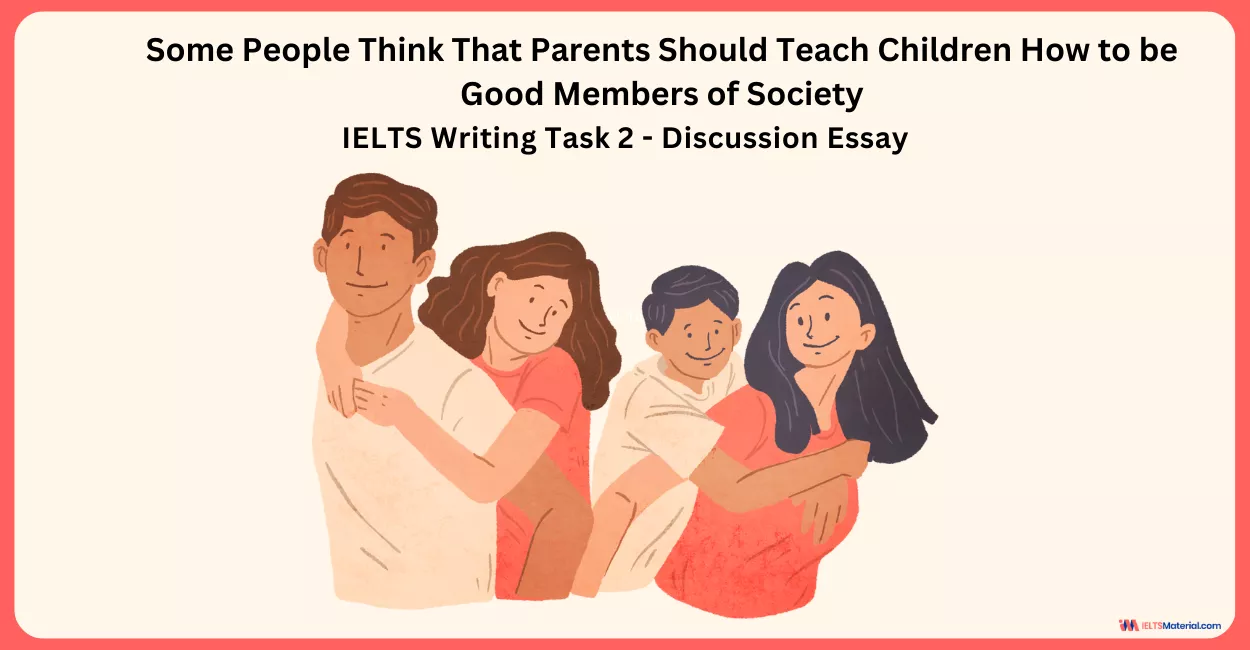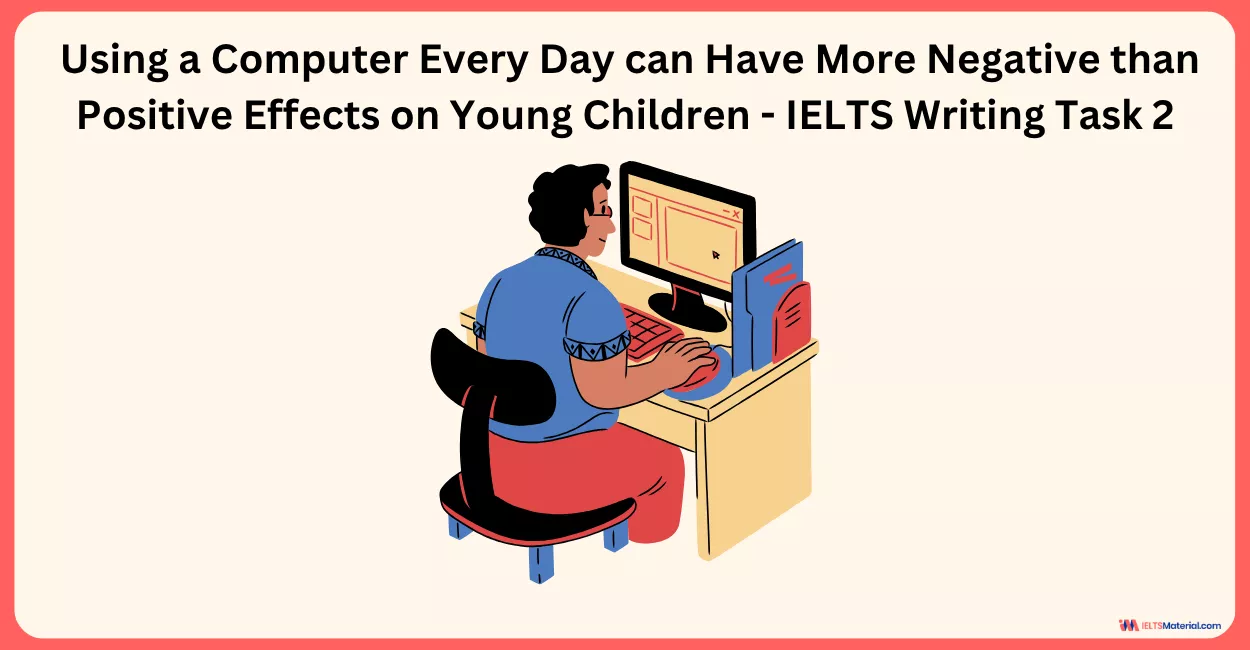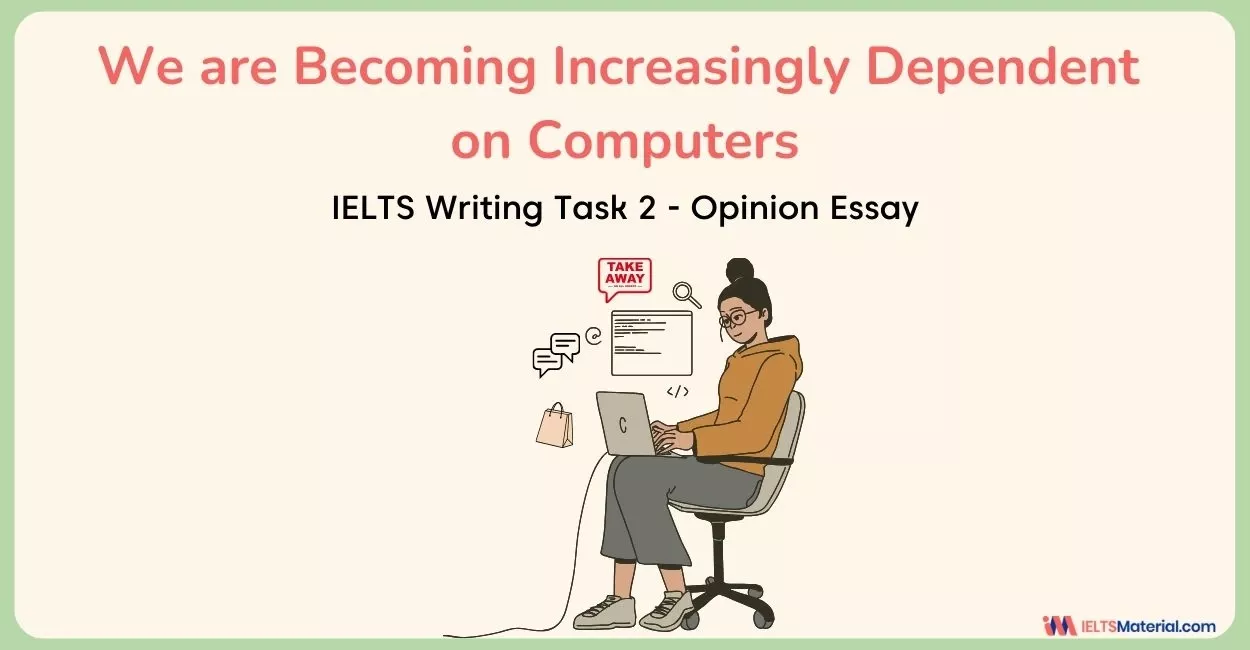Using a Computer Every Day can Have More Negative than Positive Effects on Young Children - IELTS Writing Task 2
6 min read
Updated On
-
Copy link
Explore Band 9 sample essays, and useful vocabulary for the IELTS Writing Task 2 Opinion Essay topic, “Using a Computer Every Day Can Have More Negative than Positive Effects on Young Children”, to boost your writing skills and IELTS band score.
Table of Contents
- Question
- Outline
- Using a Computer Every Day can Have More Negative than Positive Effects on Young Children - Sample Answer 1
- Using a Computer Every Day can Have More Negative than Positive Effects on Young Children - Sample Answer 2
- Using a Computer Every Day can Have More Negative than Positive Effects on Young Children - Sample Answer 3
- Using a Computer Every Day can Have More Negative than Positive Effects on Young Children - IELTS Vocabulary

Try AI Essay Checker for Instant Band Score
An Opinion Essay in IELTS Writing Task 2 requires the writer to clearly state their viewpoint on a given topic and support it with relevant reasons and examples. Expressing your opinion clearly and consistently is essential to achieve a high band score.
This blog features 3 Band 9 sample opinion essays on the topic, "Using a Computer Every Day can Have More Negative than Positive Effects on Young Children - IELTS Writing Task 2," along with useful vocabulary, to help you understand how to structure your ideas effectively and enhance your IELTS Writing performance.
Question
- You should spend about 40 minutes on this task.
- Using a computer every day can have more negative than positive effects on young children. Agree or disagree?
- You should write at least 250 words.
Outline
Essay Type
Introduction
- Sentences 1&2 – Mention that this topic has both aspects to discuss using synonyms to create a basic understanding.
- Sentence 3 – Mention your stand on the topic.
Body paragraphs
- Paragraph 1 – Talk about the negative impacts of using a computer daily.
- Paragraph 2 – Mention that it is usual for children who use the computer daily to get addicted to it.
- Paragraph 3 – Acknowledge the flip side of the argument.
Conclusion
- Restate your views.
Learn the Best IELTS Writing Task 2 Tips for Achieving Band 9 Score!
Using a Computer Every Day can Have More Negative than Positive Effects on Young Children - Sample Answer 1
It is seen that the recurring use of computers has more adverse than favourable impacts on children. While I admit that excessive use of computers can harm children in many ways, these gadgets are also crucial for their success; hence we cannot stop them from using computers. I agree with this view and will discuss it in the following paragraphs.
On the one hand, the negative impacts of using a computer daily must be emphasized. Since young children have only acquired vague self-control, they are likely to be addicted to computers, particularly video games. Spending so much time on computer games, they will lose inquisitiveness in studying and cease communicating with their peers. Moreover, their values and outlooks of the natural world might not be well developed once they fall in love with the virtual world, negatively impacting their future.
Furthermore, it is usual for children who use the computer daily to get obsessed with it. If one spends too much time on their computer, they will lose focus on their studies, and their grades will suffer. Teenagers who use the computer for long hours are also more likely to develop health problems like eye problems and obesity because of their sedentary lifestyle. Unbridled screen time can also cause vision problems in children. As a result, using computers for long hours has both physical and psychological effects that would be even more devastating for young children.
On the other hand, in this day and age, when computers are utilized in all spheres of life, it is imprudent to stop children from using them. They need proficiency in computers to find an excellent job in the future. Nowadays, they need to have computers to even score well in examinations. Hence, parents and teachers should encourage moderate use instead of preventing children from using computers. Computers and the internet are a boon to children with their studies if used wisely.
To conclude, “excess of everything is bad” is rightly said, and I acquiesce with it. It is a boon when someone uses the computer within a limit. However, unlimited use of the laptop turned this boon into a bane.
Come learn proven tips for handling IELTS Writing in our Free IELTS Webinar!
Using a Computer Every Day can Have More Negative than Positive Effects on Young Children - Sample Answer 2
It is often argued that using a computer every day can have more negative effects than positive effects on young children, and I completely agree with this view. While computers can help children learn new skills or access information, excessive use can harm their physical, mental, and social development.
For example, spending long hours in front of a screen can cause eye strain, poor posture, and even sleep problems. In addition, children may become less physically active, which increases the risk of obesity and related health issues. From a mental perspective, constant exposure to games or social media may reduce attention span and creativity, as children rely on technology for entertainment rather than exploring real-world activities.
Moreover, overuse of computers can limit social interaction. Children may spend less time communicating with family and peers, which is essential for developing communication and emotional skills. While moderate computer use can support education, too much reliance on it can have serious drawbacks.
In conclusion, although computers have some benefits for learning, using them every day can negatively affect children’s health, behavior, and social skills. Therefore, parents and teachers should ensure balanced and limited computer use to protect children’s overall development.
Get help from IELTS Experts to Ace IELTS Writing Essays! Sign up for a FREE demo now!
Using a Computer Every Day can Have More Negative than Positive Effects on Young Children - Sample Answer 3
I partially disagree with the idea that daily computer use has mostly negative effects on young children. When used properly, computers can offer significant educational benefits and help children develop important digital skills required in today’s world.
For instance, computers provide access to educational games, videos, and resources that make learning interactive and enjoyable. Children can improve their problem-solving, research, and typing skills at an early age. Additionally, using computers can encourage creativity, such as making digital art, videos, or stories.
However, it is true that overuse may cause health or social issues. The key is moderation and supervision. Parents and teachers can guide children to use computers for productive activities while limiting screen time to avoid physical strain or addiction.
In conclusion, using a computer every day is not inherently harmful. With proper guidance and a balanced approach, computers can be a positive tool for young children’s learning, creativity, and skill development.
Try our Free IELTS Writing Essay Evaluation and Correction Service! Get expert feedback and boost your score.
Using a Computer Every Day can Have More Negative than Positive Effects on Young Children - IELTS Vocabulary
The following are some of the IELTS Vocabulary found in the "Using a Computer Every Day can Have More Negative than Positive Effects on Young Children - IELTS Writing Task 2."
- Recurring
Meaning – occurring again periodically or repeatedly.
Example – My father asked me if I wanted to make a recurring payment.
- Adverse
Meaning – preventing success or development; harmful; unfavourable.
Example – Smoking could have some adverse effects on health.
- Acquiesce
Meaning – accept something reluctantly but without protest.
Example – Stella seemed to acquiesce in the decision of his mother.
- Boon
Meaning – a thing that is helpful or beneficial.
Example – Machines are sometimes a boon to humankind.
- Bane
Meaning – a cause of great distress or annoyance.
Example – Drinking alcohol every day was a bane of his life.
- Imprudent
Meaning – not showing care for the consequences of an action; rash.
Example – It would be imprudent to quit your job if you don’t have a backup plan.
- Vague
Meaning – of uncertain, indefinite, or unclear character or meaning.
Example – I wouldn’t do anything vaguely to ruin my reputation.
- Inquisitiveness
Meaning – given to examination or investigation
Example – It especially excited their inquisitiveness after seeing the products.
- Sedentary
Meaning – (of a person) tending to spend much time seated; somewhat inactive.
Example – The job of a librarian seems very sedentary.
- Devastating
Meaning – highly destructive or damaging.
Example – It would be devastating for her to let her cat go.
Visit IELTS eBooks store for top-rated books & elevate your IELTS preparation!
To conclude, this blog provides valuable insights into how to express opinions effectively in IELTS Writing Task 2 essays. By studying the 3 Band 9 sample answers, along with their advanced vocabulary and clear structure, you can learn to write a high-scoring essay on topics related to government spending and national celebrations.
More Writing Task 2 Essay Topics
- Do You Think Students Need to Wear School Uniforms
- Some People Think That it is More Important to Plant Tree in Open Areas
- People's Shopping Habits Depend More On The Age Group That They Belong to Then Other Factors
- University Education Should be Free for all Students
- Music is a Good Way of Bringing People of Different Cultures and Ages Together
- Crime Rate Nowadays is Decreasing Compared to the Past Due to Advances in Technology
Practice IELTS Writing Task 2 based on Essay types

Start Preparing for IELTS: Get Your 10-Day Study Plan Today!
Explore other Opinion Essays


Recent Articles

Haniya Yashfeen


Prity Mallick

Kasturika Samanta






Post your Comments